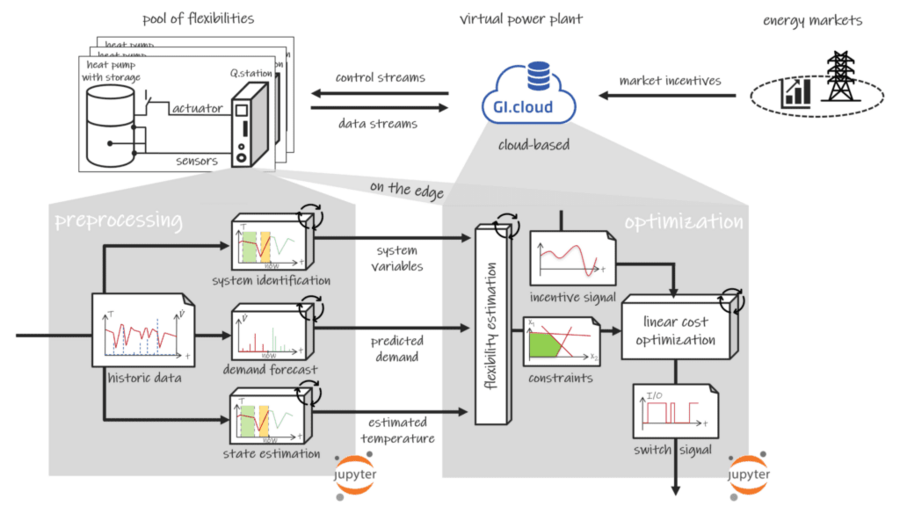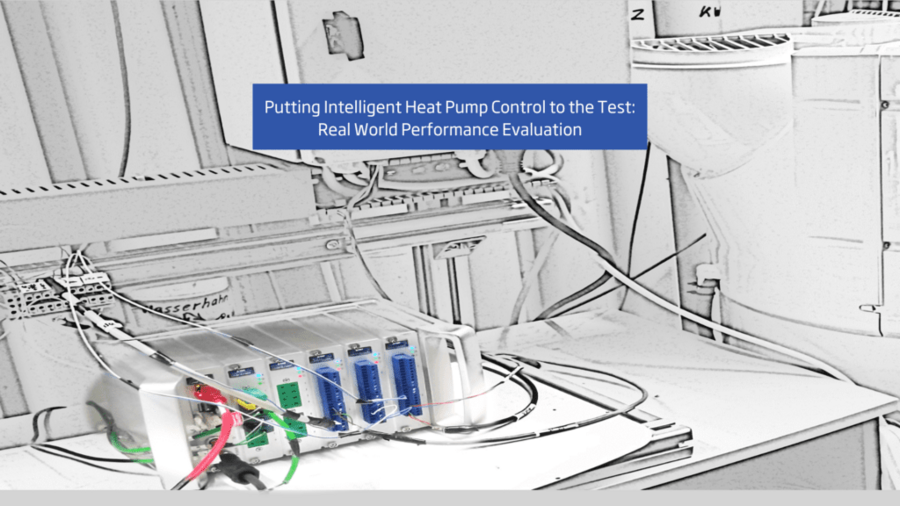Gantner Instruments is an industrial partner of the Josef Ressel Centre for Intelligent Thermal Energy Systems at the Vorarlberg University of Applied Sciences. Among other research topics, scientists at the Josef Ressel Centre investigate potential control mechanisms suitable to control fleets of heat pumps to utilize the flexibility for Demand Side Management. A Q.station edge device provides the data preprocessing steps in an industrial lab setup. It connects the heat pump system to GI.cloud, the central entity from which the scientists can control the entire fleet.

The control approach assumes to react on market incentives, such as a real-time energy market pricing system. The preprocessing of the data acquired at the heat pump system is always executed on the edge (Q.station), covering the autonomous identification of the thermal storage system and state estimation and predicting the user’s hot water demand based on data mining algorithms. These steps provide the data necessary to estimate the system’s flexibility for the near future (the following day) and the optimization problem’s constraints. The optimization routine can be executed autonomously for a single device on either the edge or the cloud comprising a swarm of heat pump systems. The goal of the optimization challenge is to minimize cost implications associated with a certain incentive, while also considering and respecting existing flexibilities. The Q.station processes the resulting switching signals to control the heat pump system.
All software developed for this research project was implemented in Python Jupyter notebooks and can be easily deployed on the Q.station and GI.cloud (as seen above).
Researchers at FH Vorarlberg are currently running multiple scenarios with the lab’s heat pump system. They mimic hot water user schedules and use Gantner’s infrastructure to optimize the schedules on GI.cloud, incorporating day-ahead pricing schemes currently available on the Austrian Energy Exchange markets.
This work is part of our research project Intelligent Thermal Energy Systems; for more exciting details, see the project page.
Authors:
Peter Kepplinger, Christian Baumann (both FHV) and Jürgen Sutterlüti
More articles
3 Trends in testing you can’t ignore any longer
Testing is an agile business by its core definition. The structures and systems to be tested, whether it is in the automotive, aerospace, energy or civil engineering segment, keep evolving quickly and the data acquisition system needs to keep pace with it. At the same time not every new, hot trend will change your tomorrow.
Read more...Mesures Solutions Expo 2024
Being close to customers is the motto of the Mesures Solutions EXPO, which will be held on October 16 and 17 at the Cité des Congrès in Lyon.
Read more...EIS-Testing Webinar
Gantner Instruments, in collaboration with FLW, is excited to invite you to a free webinar on Tuesday, September 24th, at 11:00 AM EST: "Unlocking the Full Potential of Batteries, Fuel Cells, and Electrolyzers with EIS Testing."
Read more...Streamlining Data Acquisition at CERN with Blinky-Lite and Gantner Instruments
Safe, secure, and traceable data acquisition is essential in complex, large-scale scientific environments like the European Organization for Nuclear Research (CERN). Reliable remote access is critical to supporting the diverse team members in their data acquisition (DAQ) setup and operations. Collaborating with the Blinky-lite team, we have implemented a test setup that successfully navigates these challenges in constrained environments.
Read more...